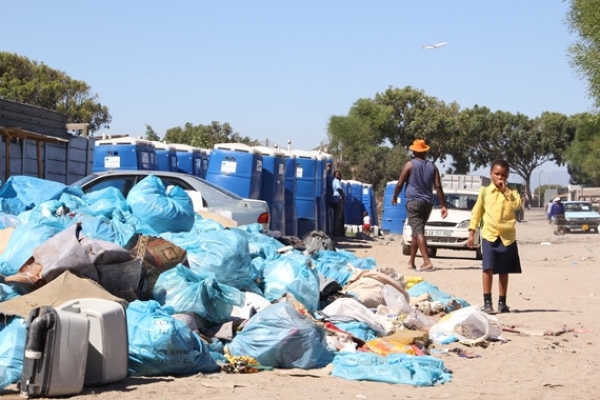De Lille to meet Siqalo committee as rubbish piles up

Cape Town Mayor Patricia de Lille will meet community leaders from Siqalo on Wednesday evening, to discuss grievances that led to violent protests in the Mitchell’s Plain informal settlement two weeks ago. De Lille condemned the protests, but community leaders maintain that residents only went on the rampage weeks after a letter to the mayor had gone unanswered.
Rubbish dumps have sprung up all around Siqalo since contract cleaners worked their last shift at the end of December. While calls for electricity and flush toilets are on the community’s agenda, when meeting with De Lille this evening, the stench and unhealthy conditions created by the garbage will be the most pressing concern, says residents committee secretary Mandisi Ngcwangu.
He holds out a letter dated 20 January requesting a meeting with the mayor to discuss the lack of refuse removal from Siqalo.
“You see, we did not make the decision to protest lightly,” says Ngcwangu.
“First we try with a letter. We ask nicely for a meeting. But, when we are ignored, we come out and take action.”
The action taken translated into tyre burning on Vanguard Drive and clashes with the police — resulting in the closure of one of Mitchell’s Plain’s main arterial roads to Cape Town earlier this month. The protests lasted a number of days. In condemning the violence of the protest, De Lille’s spokeswoman Zara Nicholson noted R500,000 worth of damage to a nearby electricity sub-station.
The breakdown between the City of Cape Town, refuse removal contractor Chippa, and the community is rooted in a dispute over the length of time that Chippa’s workers, all drawn from Siqalo itself, are employed.
“We want the jobs to rotate, so that everyone has an opportunity. It was suggested that people work for Chippa for a maximum of three months. Then it is time for someone else to get the job,” says Ngcwangu.
“We thought that the City had agreed to this, but now they are saying that all workers must be on a year contract. Also, the workers don’t get paid on time or [even] at all sometimes, so there has been no one to work since the end of last year.”
But Nicholson explained that quarterly staff rotation is not “feasible”:
“The tender calls for the labour to be changed yearly so as to provide meaningful employment to locals for a year. It was clearly explained to the community by City cleansing services management that legally and contractually a three-month rotation was not possible. The group is aware of this. Every settlement in the metro works on a 12-month employment principle.”
Other grievances to be discussed with the mayor tonight include the community’s need for electrification and flush toilets, said Ngcwangu.
Support independent journalism
Donate using Payfast

Don't miss out on the latest news
We respect your privacy, and promise we won't spam you.

This article is licensed under a Creative Commons Attribution-NoDerivatives 4.0 International License.
